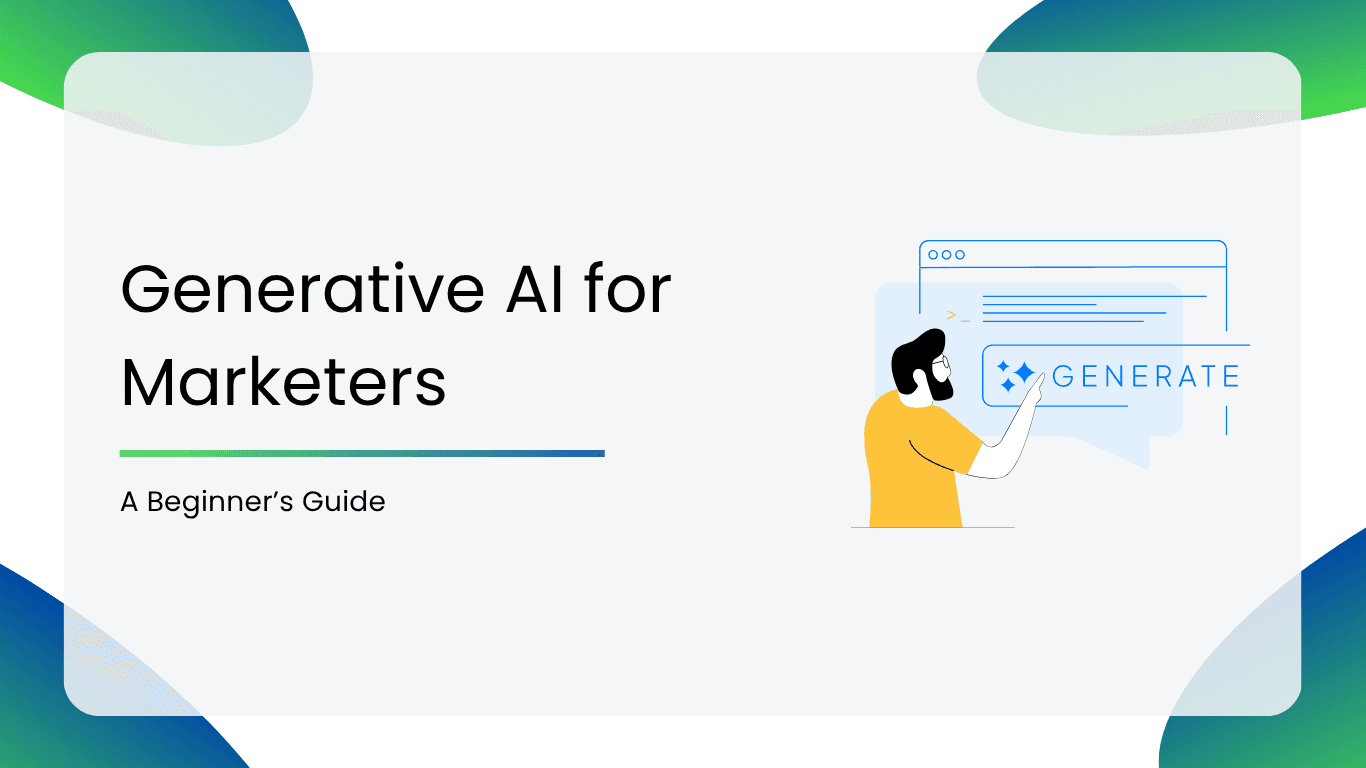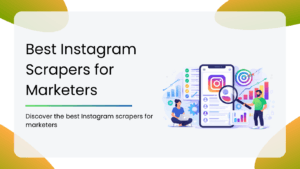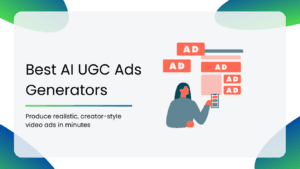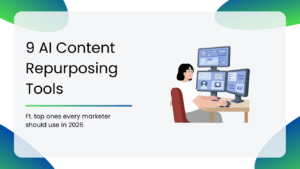AI is changing the game for marketers, making content creation smarter, personalization sharper, and data-driven decisions easier than ever. Whether you’re an experienced marketer looking to level up your strategy or just stepping into the world of AI-driven marketing, this guide will walk you through everything you need to know.
Let’s dive in and explore how Generative AI can evolve your marketing efforts by helping you work smarter, connect better, and stay ahead of the curve.
What is Generative AI?
Think of Generative AI as a super-smart assistant that doesn’t just follow instructions; it creates. Whether it’s writing, designing, or even generating videos, this AI learns from massive amounts of existing content to understand how things are typically done and then produces something entirely new.
How Does It Work?
- Learning from Examples
Imagine feeding this AI an entire library filled with books, articles, scripts, and images. Over time, it starts to recognize patterns, like how words flow in a blog post, how colors blend in a design, or how a product review is structured. - Creating New Content
Now, if you ask it to write a product description for a futuristic smartwatch, it can do that instantly. This is possible because it has learned how product descriptions typically sound. If you need an image of a “moonlit cityscape with flying cars,” it can generate one that looks just like a professional artist created it. - Mimicking Human Creativity
What makes Generative AI fascinating is that its outputs often feel human-made. Whether it’s composing ad copy, designing a social media post, or creating a personalized email, it can generate content that fits naturally within our world.
Real-World Example:
Let’s say you’re a marketer launching a new sneaker brand. Instead of spending hours brainstorming captions, writing blog posts, and designing visuals, you can use Generative AI to:
- Instantly create 10 different ad copies for A/B testing
- Generate Instagram posts that match your brand’s style
- Draft personalized email campaigns based on customer preferences
In short, Generative AI is like a creative partner that helps marketers (and many others) save time, scale content creation, and bring ideas to life faster than ever.
How is Generative AI different from Machine Learning?
Both Generative AI and Machine Learning are powerful technologies, but they serve different purposes. Think of Machine Learning as the smart learner and Generative AI as the creative mind.
Machine Learning: The Smart Learner
Imagine you have a friend who wants to recognize different types of cars. You show them tons of images and say, “This is a sedan,” “This is an SUV,” and so on. Over time, they get so good at spotting patterns that they can identify a sedan even if it’s a brand they’ve never seen before.
That’s exactly how Machine Learning works. It studies massive amounts of data to recognize patterns and make predictions. Some real-world examples include:
- Spam filters that detect unwanted emails
- Facial recognition software that unlocks your phone
- Recommendation engines (like Netflix suggesting your next binge-worthy show)
Generative AI: The Creative Mind
Now, imagine you have another friend who’s a brilliant storyteller. You give them a simple idea, “Write a story about a futuristic city,” and they instantly craft a gripping tale, complete with characters, dialogue, and plot twists.
That’s what Generative AI does. Instead of just recognizing patterns, it creates something entirely new. It can write articles, design artwork, compose music, and even generate videos, all from a simple prompt. Some examples include:
- AI tools that generate social media captions
- Chatbots that write emails or product descriptions
- Image generators that create realistic portraits of people who don’t even exist
Key Differences: Machine Learning vs Generative AI
| Feature | Machine Learning | Generative AI |
| Purpose | Recognizes patterns & makes predictions | Creates new content from scratch |
| Example Task | Identifying spam emails | Writing a blog post on a trending topic |
| Learning Style | Learns from tons of past data | Learns from past data but also generates new things |
| Real-World Use | Search engines, fraud detection | AI chatbots, AI-generated videos |
Types of Generative AI Models
Generative AI comes in different flavors, each designed for a specific kind of creativity. Think of them like a team of super-smart digital assistants, each with its own unique talent:
- GPT (Generative Pre-trained Transformer): GPT models (like GPT-3 and GPT-4) are amazing at understanding and generating text that feels natural. They can help with everything from writing blog posts and ad copies to answering questions in a way that actually makes sense. Imagine having an AI-powered content writer who never runs out of ideas!
- LLAMA (Language Learning and Modeling with Actions) by Meta: LLAMA models are another powerhouse in language understanding. They’re trained to grasp context deeply, making them useful for tasks like storytelling, generating engaging product descriptions, and even holding conversations that feel more human-like.
- BERT (Bidirectional Encoder Representations from Transformers): BERT is all about context. Instead of just looking at words one by one, it understands the entire sentence, making it super useful for search engines. When you type a query into Google, BERT helps the search engine figure out exactly what you mean so you get better results.
- StyleGAN: StyleGAN is the AI equivalent of a skilled digital artist. It can generate realistic images, design creative visuals, and even create deep-fake videos. If you’ve ever seen an AI-generated face that looks real but doesn’t belong to an actual person; that’s StyleGAN at work!
Each of these AI models is like a specialized tool in a marketer’s toolbox. In the next sections, we’ll explore how they’re transforming content creation, personalization, and decision-making in marketing.
How Generative AI Helps Marketers
Think of Generative AI as the ultimate marketing assistant. It is always on, highly creative, and capable of handling multiple tasks at once. Here’s how it’s transforming marketing:
- Creating Content That Gets Attention: Generative AI can craft compelling blog posts, social media content, ad copy, and even visuals. It’s like having a dedicated content creator who never runs out of fresh ideas, helping brands maintain a strong and engaging presence.
- Making Marketing Feel Personal: Personalization is key in modern marketing, and Generative AI makes it more effective. It can tailor recommendations, email campaigns, and ad messaging based on customer preferences, making interactions feel more relevant and engaging.
- Understanding What Customers Want: By analyzing vast amounts of data, Generative AI can uncover patterns in customer behavior, predict trends, and help marketers refine their strategies. It enables businesses to anticipate customer needs and make informed decisions.
From content creation to data-driven insights, Generative AI is redefining how brands connect with their audience, making marketing more efficient, personalized, and impactful.
Benefits of Generative AI for Marketers
- Content on Demand: Generative AI acts like an always-available content creator, generating blog posts, social media updates, ad copy, and even visuals instantly.
- Consistency in Branding: It ensures a uniform tone, style, and messaging across all marketing materials, making brand communication more cohesive.
- Time Efficiency: AI accelerates content creation, allowing marketers to focus on strategy and creativity instead of spending hours drafting or designing.
- Data-Driven Insights: AI can analyze vast datasets, identifying trends, customer behaviors, and opportunities that might otherwise go unnoticed.
Challenges of Generative AI for Marketers
- Quality Control: AI-generated content may sometimes lack nuance, context, or accuracy, requiring human oversight to refine and ensure quality.
- Originality Concerns: While AI creates new content, it’s based on existing data, which can sometimes lead to repetition or unintentional similarities with existing work.
- Ethical Considerations: AI-generated content must be monitored to prevent misinformation, bias, or unethical use in marketing campaigns.
- Learning Curve: Not all marketers are tech-savvy, and adopting AI tools requires time and effort to master their functionalities effectively.
Implementing Generative AI in Your Marketing Strategy
Incorporating Generative AI into your marketing strategy can be a game-changer, but the approach can vary based on your specific goals. Here’s how AI can enhance different areas of content creation and marketing:
Content Generation
- Blog Post Writing: AI-powered tools can generate entire blog posts on various topics based on your input, helping marketers produce high-quality content quickly. These AI-generated drafts can be refined to align with brand voice and provide value to readers.
- Product Descriptions: AI can craft detailed, engaging, and SEO-friendly product descriptions for e-commerce websites. This ensures consistency across multiple products while saving time and effort in manual writing.
- Social Media Posts: Generative AI can create engaging social media captions, posts, and even hashtag suggestions based on trends. This helps brands maintain an active online presence without constantly brainstorming new content ideas.
- Email Marketing: AI can generate personalized email content, subject lines, and customer responses, making email marketing campaigns more relevant and engaging. By analyzing customer data, AI ensures that messages resonate with the target audience.
- Ad Copywriting: AI can craft compelling and persuasive ad copy for digital marketing campaigns, ensuring it aligns with customer preferences and industry trends. This allows brands to experiment with different variations and optimize performance.
Check out this list of 15 AI copywriting tools to boost your content generation
Content Optimization
- SEO Optimization: AI can suggest SEO-friendly titles, meta descriptions, and relevant keywords to help improve search engine rankings. This ensures content is optimized for better visibility and organic traffic.
- Content Rewriting: AI can refresh outdated content by rewriting it with improved structure and clarity while maintaining relevance. This helps keep your website content fresh and engaging.
- Content Summarization: AI tools can condense long articles into short, easy-to-read summaries. This makes it easier for audiences to quickly grasp key takeaways without reading lengthy content.
- Language Translation: AI can translate content into multiple languages, making global marketing more accessible. This ensures businesses can effectively communicate with audiences across different regions.
Personalization
- Product Recommendations: AI analyzes user behavior to suggest personalized product recommendations on websites. This enhances the shopping experience and boosts conversion rates.
- Email Personalization: AI tailors email content based on user preferences, browsing history, and past purchases. Personalized emails improve engagement and make communication more relevant.
- Dynamic Website Content: AI enables websites to display content tailored to each visitor’s interests. This ensures that users see the most relevant information, improving engagement and user experience.
- Segmentation: AI can automatically segment audiences based on their behavior and demographics. This allows marketers to target specific groups more effectively with customized content.
Market Research and Analysis
- Competitive Analysis: AI gathers and analyzes competitor strategies, identifying market trends and opportunities. This helps businesses stay ahead of industry changes and adjust strategies accordingly.
- Customer Surveys: AI can create and analyze surveys to gather customer feedback and insights. This helps businesses understand customer preferences and improve their offerings.
- Market Reports: AI-generated reports provide businesses with valuable insights on industry trends, customer behavior, and market opportunities. These reports help in strategic decision-making.
- Keyword Research: AI can identify high-ranking keywords and trending topics for content marketing. This helps businesses create content that aligns with search demand.
Content Curation
- Content Aggregation: AI can pull relevant content from various sources to curate newsletters or blog updates. This saves time and ensures content remains fresh and informative.
- News Updates: AI tools can provide real-time updates on industry news and trends. This keeps businesses and audiences informed about the latest developments.
- Newsletter Creation: AI can generate well-structured newsletters with the latest industry insights. This ensures subscribers receive timely and valuable information.
Data Analysis and Reporting
- Data Interpretation: AI analyzes complex datasets and translates them into easy-to-understand insights. This helps marketers make informed, data-driven decisions.
- Performance Reports: AI can generate reports summarizing campaign performance, highlighting key metrics and areas for improvement. This helps businesses track progress and optimize strategies.
Email and Chat Support
- Chatbot Conversations: AI-powered chatbots can engage customers in natural, helpful conversations. This improves customer service by providing instant responses to inquiries.
- Email Responses: AI can automatically generate email responses for customer inquiries and support tickets. This ensures prompt replies and enhances customer satisfaction.
As we conclude this post, one thing is clear that AI is not just an emerging trend; it’s a transformative force reshaping the way marketers connect with audiences. From hyper-personalized content to AI-powered storytelling, the possibilities are limitless.
To stay ahead, marketers must embrace these advancements, adapt to evolving consumer expectations, and leverage AI-driven insights to craft more engaging, data-driven campaigns. The future of marketing isn’t just about keeping up; it’s about redefining the game.
Want to explore more? Check out our other AI-focused blogs, including
Stay ahead of the curve by checking them out now!





